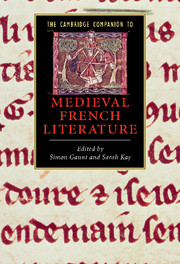Book contents
- Frontmatter
- Introduction
- Part I What is a Medieval French Text?
- Part II What is a Medieval French Author?
- Part III What is the Value of Genre for Medieval French Literature?
- Part IV How can we read Medieval French Literature Historically?
- Appendix: Reference works for Old and Middle French
- Bibliography of medieval French texts
- Suggested Further Reading
- Index
- Series List
Introduction
Published online by Cambridge University Press: 28 March 2009
- Frontmatter
- Introduction
- Part I What is a Medieval French Text?
- Part II What is a Medieval French Author?
- Part III What is the Value of Genre for Medieval French Literature?
- Part IV How can we read Medieval French Literature Historically?
- Appendix: Reference works for Old and Middle French
- Bibliography of medieval French texts
- Suggested Further Reading
- Index
- Series List
Summary
French was the most influential vernacular literature of the European Middle Ages. Early texts such as the Chanson de Roland, the Old French Tristan romances, the prose Lancelot, and the Roman de la rose were widely translated into other European languages and had an enormous impact on other vernacular traditions; later writers such as Guillaume de Machaut, Christine de Pizan, or Charles d'Orléans, had an international readership and saw themselves as working in an international context. The prestige and dissemination of French were such that writers whose mother tongue was not French wrote major texts in French (in Italy Brunetto Latini and Marco Polo, in England John Gower); even in instances where robust national traditions emerged in the wake of major authors such as Dante and Petrarch in Italy, or Chaucer in England, they did so in part at least by emulating French models.
The literary production to which this Companion is devoted dates c. 1100-1500, but there is evidence the tradition began earlier. The earliest surviving written French is found in the Serments de Strasbourg (842), a record of oaths supposedly taken by two of Charlemagne’s grandsons one of whom swears in French, the other in German. The equally brief Séquence de Sainte Eulalie (c.878), the fragmentary chanson de geste Gormont et Isembart and the Vie de St Léger (both eleventh century), suggest French was already being used sporadically for written texts before 1100, and that the Serments de Strasbourg were not therefore a flash-in-the-pan. The general lack of surviving evidence and the undoubted loss of many texts, especially from the early Middle Ages, mean that it is not always possible to delineate this production precisely.
- Type
- Chapter
- Information
- Publisher: Cambridge University PressPrint publication year: 2008



